
Partner Content: Allies will and can be found on the way and collaborative working is essential to unlock to expertise required to achieve net zero, says Louise Alter from Equans UK & Ireland
It seems only a few years ago that the UK was at the forefront of leading the charge against climate change - but recent UK policy has relaxed key targets for reaching net zero at a time when Europe and the US are investing more in decarbonisation. Nevertheless, people and businesses are still keen to do their bit and energy efficiency is crucial for net zero efforts.
In the UK, most of our emissions come from the built environment, contributing to two-fifths of the country's overall output. In 2020 the CCC estimated it would cost around £360bn to retrofit the entirety of Britain's homes and businesses to make them more energy efficient. Doing it now would save the need for buying more new materials later.
But what are the main challenges to a large-scale rollout of energy efficiency measures? The three main barriers are demand- people actually being willing to make those changes; supply chain; and of course, money.
During a panel discussion at the Net Zero Festival earlier this month, I spoke to leading experts on the implications of energy efficiency for businesses, exploring best practices, challenges, and opportunities for investment.
One of the key steps to achieving Net Zero is about collaboration. Businesses and organisations partnering with experts in the field to create smarter buildings and processes to drive forward the net zero agenda. Phil Butters, director of estates and campus services at Keele University, spoke about how the University has worked with Equans, providing an excellent case study of how partnership working has contributed to developing a decarbonisation strategy for a community of homes and businesses the size of a small town.
"With an investment from both the government and the European Union, the campus has been able to invest in both driving efficiencies and investing in research and innovation on how to tackle energy efficiencies and climate change," he says. "Equans are now supporting the university to create a plan on how we can further enhance the Smart Energy Network Demonstrator at Keele, the only at-scale demonstrator in Europe, to enable the transition into a true smart campus where we only use energy when it's needed, and reducing the c.8,000 tonnes of carbon we still produce. They are also helping to influence procurement processes, supply chain, policy and changing attitudes. The key to achieving net zero globally is through working in partnerships."
He goes on to say: "Higher education, further education, big businesses and local authorities have a role to play in leading transformational change. We need to understand who has the opportunity to take the first step and this is about understanding how you can share the solution with others."
Jamie Browne, senior business development manager at the Energy Saving Trust gave some tips for businesses on how they can start work towards net zero by implementing a three-point plan which keeps it manageable, so you don't necessarily have to spend thousands on something that isn't the day job.
"Firstly, don't overlook the more mundane bits such as insulation and draft exclusion," he says. "The second thing is that employee engagement is really important, getting them on board with how they can help both at home and in the workplace. And the third thing is to measure where you are now, because without knowing where you are now, you can't accurately measure where you want to be in five or 10 years."
One of the biggest barriers to implementing change is money. Matt Ferretti, head of partnerships at the Green Finance Institute asked the audience who knew the EPC rating of their home or business and received a positive response, however this lessened with the question of how many had a plan to decarbonise that property. He pointed out that even in a room of people engaged on this topic, it still wasn't the case that people knew how to move forward in terms of energy efficiencies.
"Innovating new financial products and scaling existing solutions is important, and green mortgages are one example where lenders are offering incentives for owning an energy efficient home or investing in upgrading," he says. "To continue to drive demand for these products, we need to look at education help people to understand the benefits of decarbonising their home or office. How do we work with financial planners, lenders, estate agents, architects etc. to provide that information and education to enable everyone to understand the options to improve their home or building? This is an important step to educate people."
Net zero is an important topic and this conversation shows how much there is that we can all do to play our part in driving decarbonisation both in the workplace and at home. As organisations progress their net zero journey, they should understand where they currently are, where they want to go and what it will require. Making mistakes is ok, in the spirit of embracing learning and improvement of these plans along the way.
It is effective to start with smaller actions which create savings such as improving buildings through energy efficiency measures, and engaging staff. Allies will and can be found on the way and collaborative working is essential to unlock to expertise required to achieve net zero.
Louise Alter is head of energy innovation at Equans UK & Ireland.
This article is sponsored by Equans.







